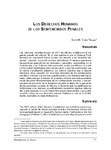| dc.contributor.author | Cobo Téllez, Sofía Magdalena | |
| dc.date.accessioned | 2018-10-09T16:09:59Z | |
| dc.date.available | 2018-10-09T16:09:59Z | |
| dc.date.issued | 2014-07 | |
| dc.identifier.issn | 1665-8639 | |
| dc.identifier.uri | http://repositorio.lasalle.mx/handle/lasalle/599 | |
| dc.description.abstract | Las reformas constitucionales de 2011 en México modificaron el segundo párrafo del artículo 18, el cual establece que el Sistema Penitenciario se organizará sobre la base del respeto a los derechos humanos además, el párrafo primero del artículo 1º instaura que todas las personas gozarán de los derechos y garantías reconocidas en la Constitución y los Tratados Internacionales en los que México es parte y sólo podrán restringirse salvo en los casos y bajo las condiciones que la misma Constitución establece. Lo anterior significa que el Estado Mexicano debe respetar los derechos humanos de los sentenciados penales y adecuar sus normas e instituciones a los tratados internacionales ratificados por el mismo. El presente artículo centrará su análisis en los derechos fundamentales de los sentenciados penales —concretamente los privados de la libertad— durante la etapa de la ejecución de las sanciones penales en México, la Doctrina que ha justificado las limitaciones a los mismos, para finalmente mencionar algunos criterios del poder judicial y la Corte Interamericana en este sentido y así poder concluir cuáles de sus derechos pueden limitarse y cuál es el fundamento normativo de tales limitaciones. / The 2011 reform of the Mexican Constitution amended the second paragraph of article 18, which provides that the Penitentiary System will be organized based on respect for human rights. Furthermore, the first paragraph of Article 1 of the Constitution provides that all persons shall have the individual rights granted by the Constitution and by the International Treaties to which Mexico is a party, and such rights can only be restricted in the cases and under the circumstances provided for in the Constitution. This means that the Mexican State must respect the human rights of people sentenced for committing a crime and adapt its laws and institutions to the international treaties to which it is a party. This article analyzes the fundamental rights of people who have been sentenced for committing crimes —especially of those who have been convicted— while they serve their sentences in Mexico, the doctrine that has justified the restrictions applied on those rights and, finally, it also refers to some criteria from the judiciary and the Inter-American Court of Justice and draws conclusions as to which rights can be limited and what is the legal foundation for such limitations. | es_MX |
| dc.format | pdf | es_MX |
| dc.language.iso | spa | es_MX |
| dc.publisher | Universidad La Salle, Facultad de Derecho | es_MX |
| dc.rights | Acceso abierto | es_MX |
| dc.rights.uri | http://creativecommons.org/licenses/by-nc-nd/4.0 | * |
| dc.subject | Derechos fundamentales | es_MX |
| dc.subject | Reformas constitucionales | es_MX |
| dc.subject | Ejecución de sanciones penales | es_MX |
| dc.subject | Sistema penitenciario | es_MX |
| dc.subject | Reinserción social | es_MX |
| dc.subject | Doctrina de sujeción especial | es_MX |
| dc.subject | Criterios jurisprudenciales | es_MX |
| dc.subject | Suprema Corte de Justicia de la Nación | es_MX |
| dc.subject | Corte Interamericana de Derechos Humanos | es_MX |
| dc.subject | Fundamental rights | es_MX |
| dc.subject | Constitutional reforms | es_MX |
| dc.subject | Execution of criminal sentences | es_MX |
| dc.subject | Penitentiary system | es_MX |
| dc.subject | Readaptation to the community | es_MX |
| dc.subject | Special subject doctrine | es_MX |
| dc.subject | Case law criteria | es_MX |
| dc.subject | Mexican Supreme Court of Justice | es_MX |
| dc.subject | InterAmerican Human Rights Commission | es_MX |
| dc.subject.classification | CIENCIAS SOCIALES::CIENCIA POLÍTICA::SOCIOLOGÍA POLÍTICA::DERECHOS HUMANOS | es_MX |
| dc.title | Los derechos humanos de los sentenciados penales | es_MX |
| dc.type | article | es_MX |
| dc.audience | generalPublic | es_MX |







